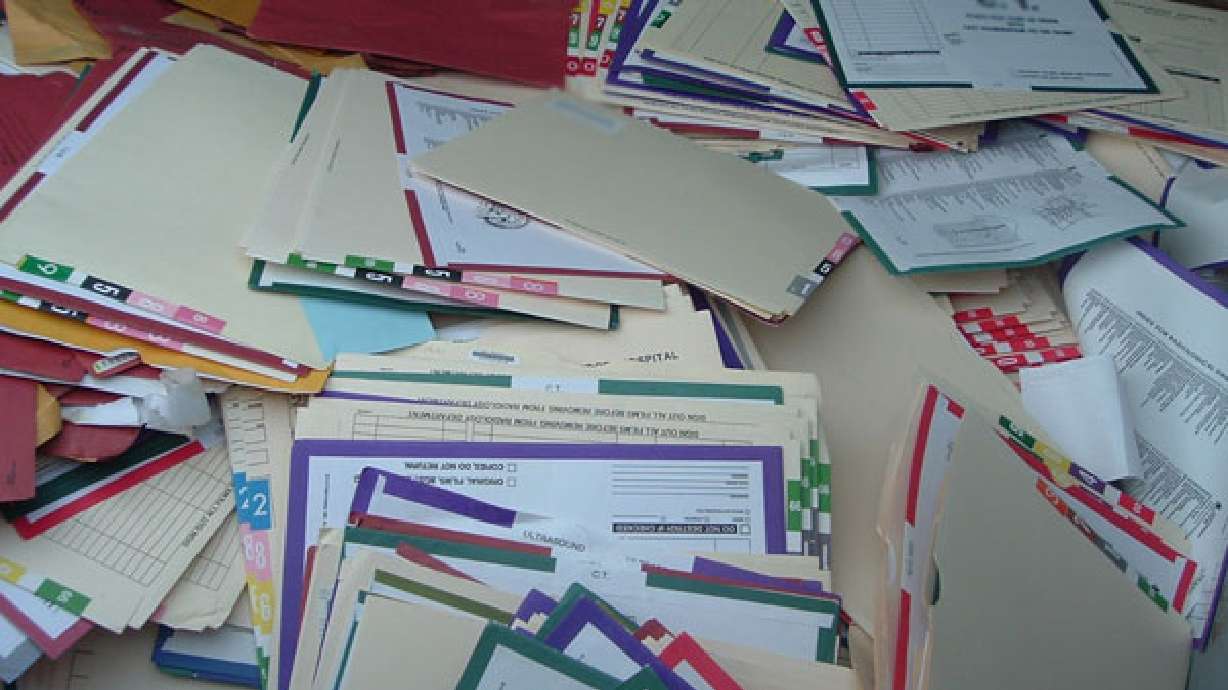Estimated read time: 4-5 minutes
This archived news story is available only for your personal, non-commercial use. Information in the story may be outdated or superseded by additional information. Reading or replaying the story in its archived form does not constitute a republication of the story.
Randall Jeppesen and Marc Giaugue Reporting A surprising discovery in a Utah County dumpster--medical records just tossed out, accessible by anyone who walks past.
Now the State and hospitals are investigating, saying this absolutely shouldn't be happening.
Along a busy road in American Fork, just 20 steps from the sidewalk, there's a blue dumpster recycling bin. What was found inside the bin is disturbing.
We showed pictures of the discarded medical files to Assistant Utah Attorney General Richard Hamp. The pictures show folders full of paper work with names and social security numbers, all detailing medical procedures.

Assistant Utah Attorney General Richard Hamp: "In a word: alarmed. Here we have a business that seems to be totally oblivious to the problem of identity theft. Quite frankly I'm sure any business owner would be alarmed if their names showed up in this trash dumpster with their personal files there."
X-ray film in the files contains silver particles that are sent to a recycling plant in Eureka where the silver is reclaimed. The medical files are supposed to be destroyed under contract.

With information from some of the files, we easily found two individuals: Enrique and Elizabeth. Both of them live in the Salt Lake area. Papers with their names on them - papers from IHC hospitals - were sitting right on top of the dumpster pile.
Enrique: "It's kind of scary though. I mean it's scary because they can, you know, steal anything from you with your social security number. They can know where you are. They can do anything with that."

Other files led us to the University of Utah Hospital.
Assistant Utah Attorney General Richard Hamp: "There's names on all the files and they're all full of their paperwork.
Director of Health Information Al Toe-ka Na-ga Tokunaga: "That's our consent form right there."
He says it's a disturbing violation.
Tokunaga said they spend a lot of money and take great steps to ensure patient privacy. All printed medical files used in the hospital are shredded before they leave the building. But sometimes files are sent out of the hospital for treatment purposes or for processing. Tokunaga said in these cases, strict contracts are signed outlining how the files have to be destroyed to protect privacy.
Director of Health Information Al Toe-ka Na-ga Tokunaga: "All of our records that are used for patient care treatment that are in electronic form or paper should be shredded."

We went back to the dumpster several times. It was always unlocked with more files and more names.
Assistant Utah Attorney General Richard Hamp: "A. That's in violation of Utah law, and B. It's just plain stupid at this point that anybody would do that with other people's personal information."
All of the hospitals contacted by KSL Newsradio launched their own investigations to see if HIPAA regulations have been violated. Hamp said leaving this type of information in a dumpster could also violate a state civil law passed last year.
Assistant Utah Attorney General Richard Hamp: "It makes it a violation civilly to fail to destroy personal information such as this in a way so that it's illegible either by shredding or burning or some way altering the information so it can't be read. The law provides for a penalty of up to $2,500 per individual up to $100,000 in total fines if there is a number of aggregate individuals affected."
No fines have been levied at this point as investigations are ongoing. Tokunaga said the U.'s hospitals and clinics are also in the process of switching from paper to digital records, which could help stop this problem from occurring in the future.
But just how big is this problem? How many hospitals are involved? Why are the records even here? Could they be yours?

Assistant Utah Attorney General Richard Hamp: "I can say comfortably that we're dealing with thousands of people's medical records that have been compromised."
There are two companies involved, Affinity Services and Nelson Refining. The two companies are so concerned about what happened that they attempted to get a court order to stop the story. In court documents, the companies claim that KSL Newsradio is giving false information to the public by claiming records from their recycling operation were left in an open dumpster. The companies claim it's a recycling bin, not a dumpster.
Their request to stop the story was rejected by a judge who found their arguments had no merit.
The companies claim they've already lost major contracts with IHC and HCA Columbia. A lawsuit has been filed that seeks unspecified punitive and monetary damages from KSL Newsradio.
We'll have more tomorrow. Be sure to check back for Part Two of this exclusive KSL Newsradio series.









